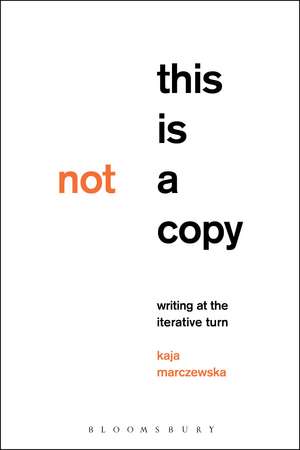This Is Not a Copy: Writing at the Iterative Turn
Autor Dr. Kaja Marczewskaen Limba Engleză Hardback – 21 feb 2018
| Toate formatele și edițiile | Preț | Express |
|---|---|---|
| Paperback (1) | 232.34 lei 6-8 săpt. | |
| Bloomsbury Publishing – 21 aug 2019 | 232.34 lei 6-8 săpt. | |
| Hardback (1) | 774.62 lei 6-8 săpt. | |
| Bloomsbury Publishing – 21 feb 2018 | 774.62 lei 6-8 săpt. |
Preț: 774.62 lei
Preț vechi: 1113.40 lei
-30% Nou
Puncte Express: 1162
Preț estimativ în valută:
148.24€ • 153.89$ • 123.61£
148.24€ • 153.89$ • 123.61£
Carte tipărită la comandă
Livrare economică 22 martie-05 aprilie
Preluare comenzi: 021 569.72.76
Specificații
ISBN-13: 9781501337833
ISBN-10: 1501337831
Pagini: 320
Ilustrații: 21 bw illus
Dimensiuni: 152 x 229 x 25 mm
Greutate: 0.57 kg
Editura: Bloomsbury Publishing
Colecția Bloomsbury Academic
Locul publicării:New York, United States
ISBN-10: 1501337831
Pagini: 320
Ilustrații: 21 bw illus
Dimensiuni: 152 x 229 x 25 mm
Greutate: 0.57 kg
Editura: Bloomsbury Publishing
Colecția Bloomsbury Academic
Locul publicării:New York, United States
Caracteristici
A new, interdisciplinary perspective on creative practice in the 21st century that grapples with new technologies and the growing significance of questions of copyright, creative commons and the politics of open access
Notă biografică
Kaja Marczewska is Lecturer in English and Visual Culture at the University of Westminster, London, UK. Her research focuses on experimental arts and writing, print culture and innovative forms of publishing, contemporary aesthetics, and intersections of art, technology and law.
Cuprins
FiguresAcknowledgementsReprint Credits"Plagiarizing Well Is Hard To Do": An IntroductionChapter 1: The Iterative TurnChapter 2: ErasureChapter 3: TranscriptionChapter 4: CodeBibliographyNotesIndex
Recenzii
It should be reiterated: this original and creative account of the 'unoriginal genius' behind 'uncreative writing' is not merely another contribution to the critical literature on conceptual, code-based, and partially-erased poetry. Rather, This Is Not A Copy rethinks the very concepts of copying and authorship themselves. We live now in a world where iteration is the fundamental mode of engaging culture. Rather than start from problems (whether ethical, legal, or aesthetic), Marczewska thus starts with a solution. More than an reckoning of the recent past, this book is a way forward.
Focusing on various forms of iteration (including erasure, transcription, curation, assemblage, and digital coding) Kaja Marczewska's outstanding study should prove to be the gold standard for teachers and students who are interested in exploring how contemporary poets and artists have engaged with an avant-garde tradition of conceptualism to rethink traditional Romantic (Lockean) ideas of creativity and authorship, and to ask tough questions about how transformative a text must be (or should need to be) to avoid copyright infringement. Thorough, informed, soundly interpreted, and it is hard to imagine a book more up-to-date or concerning a movement that is more of-the-moment.
In This Is Not a Copy, Kaja Marczewska demarcates with great intelligence and careful scholarship the history of an aesthetic shift, the Iterative Turn that affords us an understanding of an expanded form of writing demanding an alternative skill set and including copying as an act of writing in and of itself. Marczewska breaks down for us three experimental approaches to writing that dominate the contemporary avant-garde poetic scene: erasure, transcription and coding. She links these to earlier avant-garde moments and suggests that the iteration is not just defined at the level of material reproduction but in terms of repeating existing artistic procedures as well. Both are made in direct response to a technologically driven society of postproduction where information is constantly being selected and reframed to generate new meanings in order to disrupt the existing order of things. Iterative writing is presented as a complex system of creative practice and critical thought. This book is essential for readers with 'aesthetic attitude' who think about the limits of literature and the creative potential of writing in the digital age.
Focusing on various forms of iteration (including erasure, transcription, curation, assemblage, and digital coding) Kaja Marczewska's outstanding study should prove to be the gold standard for teachers and students who are interested in exploring how contemporary poets and artists have engaged with an avant-garde tradition of conceptualism to rethink traditional Romantic (Lockean) ideas of creativity and authorship, and to ask tough questions about how transformative a text must be (or should need to be) to avoid copyright infringement. Thorough, informed, soundly interpreted, and it is hard to imagine a book more up-to-date or concerning a movement that is more of-the-moment.
In This Is Not a Copy, Kaja Marczewska demarcates with great intelligence and careful scholarship the history of an aesthetic shift, the Iterative Turn that affords us an understanding of an expanded form of writing demanding an alternative skill set and including copying as an act of writing in and of itself. Marczewska breaks down for us three experimental approaches to writing that dominate the contemporary avant-garde poetic scene: erasure, transcription and coding. She links these to earlier avant-garde moments and suggests that the iteration is not just defined at the level of material reproduction but in terms of repeating existing artistic procedures as well. Both are made in direct response to a technologically driven society of postproduction where information is constantly being selected and reframed to generate new meanings in order to disrupt the existing order of things. Iterative writing is presented as a complex system of creative practice and critical thought. This book is essential for readers with 'aesthetic attitude' who think about the limits of literature and the creative potential of writing in the digital age.
